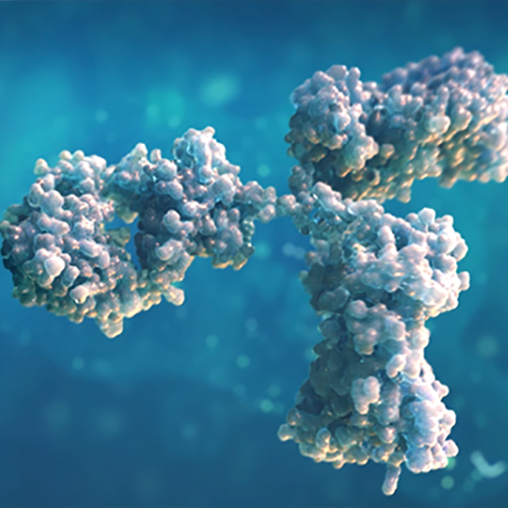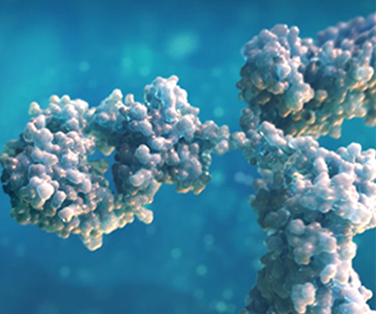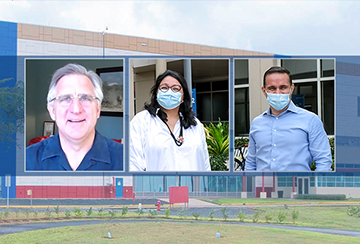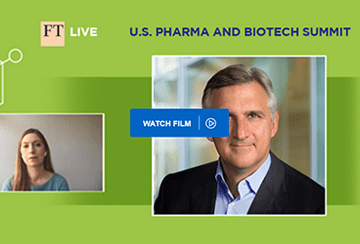Until a vaccine can be found that provides immunity against SARs-CoV-2 infections, an antibody-based therapy could emerge as an option to prevent or treat COVID-19 in the interim. Amgen and Adaptive Biotechnologies are hard at work on a potential medicine, and the top scientists from both companies recently provided their perspectives on their new R&D collaboration.
“We are focused on making progress as quickly as possible,” said David Reese, Amgen’s executive vice president for Research and Development. “We are trying to strike the right balance between getting the highest quality antibody or antibodies as therapeutic candidates with the shortest timeline that we can manage. We see our effort as complementary to other efforts in the industry. We don’t view this as a competition but as an all-hands-on-deck moment.”
Speaking at a webinar held April 9, Reese and Harlan Robins, chief scientific officer and co-founder at Adaptive Biotechnologies, addressed a range of questions on the science behind the collaboration and key factors that would determine the program’s success. Topics included the potential efficacy of neutralizing antibodies, the genetics of SARs-CoV-2, and Amgen’s manufacturing capabilities.
“To find a truly effective antibody—or as we like to say, the Michael Jordan of antibodies—is quite difficult,” said Robins. He likened the search now underway to “scouting every single high school basketball player in the country at the same time. But this is what Adaptive’s platform is built to do.”
A scale well beyond past efforts
The adaptive immune system is “nature’s most finely tuned diagnostic and therapeutic for most diseases,” Robins said. But when a deadly virus like SARs-CoV-2 appears suddenly, people with weakened immune systems or complications may succumb, while those with healthier immune systems survive and generate antibodies to protect against future infections. Potent antibodies culled from survivors could provide the basis for a therapy to prevent or treat COVID-19 in others by neutralizing the virus.
Neutralizing antibodies have been used to treat other diseases, including Ebola, with at least some success. Amgen and Adaptive hope to take this therapeutic approach to the next level by using Adaptive’s sophisticated DNA sequencing and machine learning capabilities to search for highly potent antibodies at a scale well beyond past research efforts for other diseases.
Robins said that Adaptive expects to screen a set of antibodies that is one or two orders of magnitude larger than the antibody pools evaluated in previous hunts for neutralizing antibodies. “We’re hoping that we’ll be more likely to find that needle in the haystack—that really special antibody,” he said.
Part of the challenge will be to find antibodies that are broadly effective against different strains of SARs-CoV-2 and the various mutations the virus may generate. Amgen’s deCODE Genetics subsidiary has been sequencing samples of SARs-CoV-2 RNA taken from individuals who tested positive in Iceland which can help provide additional insights.
“While we would love to have a single antibody, it’s possible that a cocktail of several antibodies will be required,” said Reese. “As we move along, we are making plans to be able to handle that.”
Saving patients, protecting health care workers
Once the best antibody or antibodies are identified, Amgen will apply its expertise in genetics, immunology, antibody engineering, and manufacturing to optimize, develop, and produce a potential therapy designed to prevent and treat COVID-19. Reese said it was too early to project what the effective dose of a neutralizing antibody might be, or how many doses Amgen would be positioned to manufacture while still maintaining the full supply of its other antibody and protein medicines.
“How much we will need will of course depend on the characteristics of the therapeutic itself,” he said. “I think the good news here is that, in all likelihood, we anticipate that one or two doses over a period of a few weeks could be sufficient in a therapeutic setting.”
Early intervention is also likely to be a key success factor for any neutralizing antibody, Reese said. “One thing we have clearly learned, especially from the Ebola experience, is that the time point at which you intervene has a huge effect on outcome. Administering the treatment earlier in the course of disease gives it a much greater shot at efficacy.”
He also emphasized that an antibody therapy could be used prophylactically to protect frontline health care workers until an effective vaccine emerges. Even then, given the enormous task of making and administering enough vaccine to immunize people around the world, an effective antibody therapy could still prove necessary and useful for years.
It is also too early to project how long it might take to advance a neutralizing antibody into clinical trials, Reese said. “I think it would be disingenuous to give a timeline when we are just moving forward with the research phase now. But we’re trying to work on a timeframe of months, not years. We are doing many things in parallel that we would do sequentially in a typical development program, balancing the goal of getting the highest quality antibody against speed.”
For more information on Amgen’s resources related to the SARS-CoV-2 pandemic, visit our COVID-19 Information Center.
Forward-Looking Statements
This communication contains forward-looking statements that are based on the expectations and beliefs of Amgen as of March 31, 2020, and which are statements made as of such date (except for any statements relating to our collaboration with Adaptive Biotechnologies, which are made as of April 2, 2020). All statements, other than statements of historical fact, are statements that could be deemed forward-looking statements, including any statements on the outcome, benefits and synergies of collaborations, or potential collaborations, with any other company, including Adaptive Biotechnologies (including statements regarding such collaboration’s ability to discover and develop fully-human neutralizing antibodies targeting SARS-CoV-2 to potentially prevent or treat COVID-19), BeiGene, Ltd., or the Otezla® (apremilast) acquisition, including anticipated Otezla sales growth and the timing of non-GAAP EPS accretion, as well as estimates of revenues, operating margins, capital expenditures, cash, other financial metrics, expected legal, arbitration, political, regulatory or clinical results or practices, customer and prescriber patterns or practices, reimbursement activities and outcomes, effects of pandemics or other widespread health problems such as the ongoing COVID-19 pandemic on our business, and other such estimates and results. Forward-looking statements involve significant risks and uncertainties, including those discussed below and more fully described in the Securities and Exchange Commission reports filed by Amgen, including our most recent annual report on Form 10-K and any subsequent periodic reports on Form 10-Q and current reports on Form 8-K. Unless otherwise noted, Amgen is providing this information as of the date of this communication and does not undertake any obligation to update any forward-looking statements contained in this document as a result of new information, future events or otherwise.
No forward-looking statement can be guaranteed and actual results may differ materially from those we project. Our results may be affected by our ability to successfully market both new and existing products domestically and internationally, clinical and regulatory developments involving current and future products, sales growth of recently launched products, competition from other products including biosimilars, difficulties or delays in manufacturing our products and global economic conditions. In addition, sales of our products are affected by pricing pressure, political and public scrutiny and reimbursement policies imposed by third-party payers, including governments, private insurance plans and managed care providers and may be affected by regulatory, clinical and guideline developments and domestic and international trends toward managed care and healthcare cost containment. Furthermore, our research, testing, pricing, marketing and other operations are subject to extensive regulation by domestic and foreign government regulatory authorities. We or others could identify safety, side effects or manufacturing problems with our products, including our devices, after they are on the market. Our business may be impacted by government investigations, litigation and product liability claims. In addition, our business may be impacted by the adoption of new tax legislation or exposure to additional tax liabilities. If we fail to meet the compliance obligations in the corporate integrity agreement between us and the U.S. government, we could become subject to significant sanctions. Further, while we routinely obtain patents for our products and technology, the protection offered by our patents and patent applications may be challenged, invalidated or circumvented by our competitors, or we may fail to prevail in present and future intellectual property litigation. We perform a substantial amount of our commercial manufacturing activities at a few key facilities, including in Puerto Rico, and also depend on third parties for a portion of our manufacturing activities, and limits on supply may constrain sales of certain of our current products and product candidate development. An outbreak of disease or similar public health threat, such as COVID-19, and the public and governmental effort to mitigate against the spread of such disease, could have a significant adverse effect on the supply of materials for our manufacturing activities, the distribution of our products, the commercialization of our product candidates, and our clinical trial operations, and any such events may have a material adverse effect on our product sales, business and results of operations. We rely on collaborations with third parties for the development of some of our product candidates and for the commercialization and sales of some of our commercial products. In addition, we compete with other companies with respect to many of our marketed products as well as for the discovery and development of new products. Discovery or identification of new product candidates or development of new indications for existing products cannot be guaranteed and movement from concept to product is uncertain; consequently, there can be no guarantee that any particular product candidate or development of a new indication for an existing product will be successful and become a commercial product. Further, some raw materials, medical devices and component parts for our products are supplied by sole third-party suppliers. Certain of our distributors, customers and payers have substantial purchasing leverage in their dealings with us. The discovery of significant problems with a product similar to one of our products that implicate an entire class of products could have a material adverse effect on sales of the affected products and on our business and results of operations. Our efforts to collaborate with or acquire other companies, products or technology, and to integrate the operations of companies or to support the products or technology we have acquired, may not be successful. A breakdown, cyberattack or information security breach could compromise the confidentiality, integrity and availability of our systems and our data. Our stock price is volatile and may be affected by a number of events. Our business performance could affect or limit the ability of our Board of Directors to declare a dividend or our ability to pay a dividend or repurchase our common stock. We may not be able to access the capital and credit markets on terms that are favorable to us, or at all.





